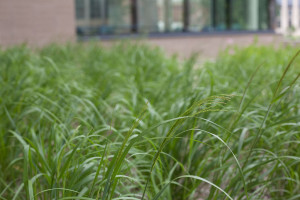
Switchgrass (Panicum virgatum) is a hardy, key bioenergy crop. Credit: Great Lakes Bioenergy Reserach Center, Flickr CC
Farming is a Minnesota legacy. Clean water is a legacy Governor Mark Dayton hopes to leave behind. These two things don’t need to be at odds, and legislation to support perennial biofuels proves this. How do we protect the health of Minnesotans and our drinking water, while at the same time supporting a thriving community of farmers in greater Minnesota?
The answer is in finding a win-win crop that both protects our water and contributes to a farmer’s bottom line. This is where an incentive for growing perennial biofuels comes in.
Last session, a bill was introduced that would incentivize the production of perennial biofuels. Perennial biofuels are biofuels created from alternative materials to corn, such as grasses. Last year’s legislation provided the following opportunities:
- Established a $5 million tax credit for perennial biofuel production
- Requires producers building cellulosic ethanol plants to include 10% perennial crops the first year of production, escalating up to 50% in the fifth year
These things together could create a new $840 million industry in Minnesota, according to the Bioeconomy Coalition.
There is one key component of the legislation missing: where will we get these perennials? It’s time to fully incentivize the program and close the legislative gap. The demand has been created for perennial crops, but now we need the supply to match. This is the next logical step in ensuring that our new perennial biofuels program is a success.
A bill has been introduced that will close this gap. HF2881 and SF2711 provide incentives for landowners that truly make a difference. These bills:
- Give an incentive to those farmers willing to divert land to perennial crop growth from agricultural use
- Give priority to farmers that also implement water protection programs.
The economic benefits of this are clear. Many farmers are reluctant to give up part of their land for water quality maintenance because they could theoretically be making gains from utilizing that land. However, this provision would mean that farmers no longer have to see a total loss in order to protect water. It promotes a new industry for Minnesota, while at the same time prioritizing clean water.
Minnesotans deserve clean, safe drinking water. It is essential for our health for generations, and if we act now we can make a very real difference. With the economy still recovering, it’s important to find new ways of generating wealth. When we can generate new wealth at the same time that we preserve our environment for generations to come, we create a truly sustainable Minnesota.
This is a wonderful start or maybe solution to the farming water problem. I want to know how Gov. Dayton will keep the waters in Northeast MN clean if he approves copper-nickel mining?